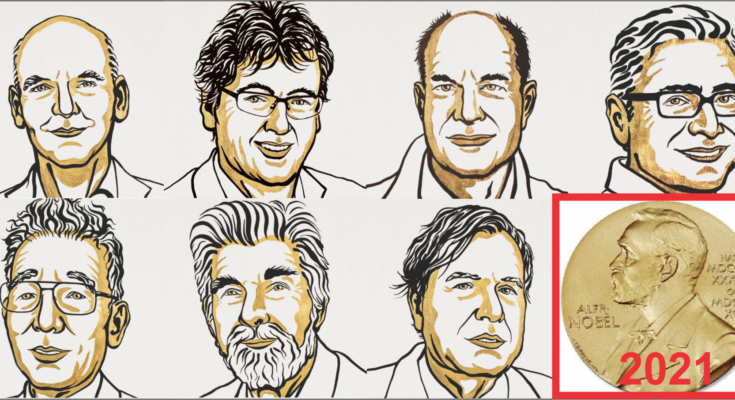This week, the special committees based in Norway and Sweden announced the winners of the Nobel Prize for the year 2021 in the fields of physics, chemistry, physiology or medicine, literature, and peace and economic sciences. The Royal Swedish Academy of Sciences and the Nobel Assembly at Karolinska Institutet have already announced the winners of all the science related disciplines.
The Nobel Prize in Chemistry 2021
As announced by the Royal Swedish Academy of Sciences, the Nobel Prize in Chemistry 2021 has been awarded to Benjamin List from Germany and David W.C. MacMillan from the USA for their outstanding contributions to the development of asymmetric organocatalysts which can be used as precise new tools for molecular construction.

In announcing the winners of the Nobel Prize in Chemistry for the year 2021, the Royal Swedish Academy of Sciences described the importance of this discovery in their press release,
“Many research areas and industries are dependent on chemists’ ability to construct molecules that can form elastic and durable materials, store energy in batteries or inhibit the progression of diseases. This work requires catalysts, which are substances that control and accelerate chemical reactions, without becoming part of the final product. For example, catalysts in cars transform toxic substances in exhaust fumes to harmless molecules. Our bodies also contain thousands of catalysts in the form of enzymes, which chisel out the molecules necessary for life.”

“Catalysts are thus fundamental tools for chemists, but researchers long believed that there were, in principle, just two types of catalysts available: metals and enzymes. Benjamin List and David MacMillan were awarded the Nobel Prize in Chemistry in 2021 because in 2000 they developed a third type of catalysis, independent of each other. It is called asymmetric organocatalysis and builds upon small organic molecules.” The press release further states.
Nobel Prize in Physics 2021
On 5th October 2021, the Royal Swedish Academy of Sciences announced the names of Syukuro Manabe from Princeton University, USA, and Klaus Hasselmann from Max Planck Institute for Meteorology, Hamburg, Germany, for their contributions towards physical modelling of the Earth’s climate, quantifying variability and reliably predicting global warming, and the name of Giorgio Parisi from Sapienza University of Rome, Italy for the discovery of the interplay of disorder and fluctuations in physical systems from atomic to planetary scale, as the winners of the year 2021. Half of the prize will be shared between Syukuro Manabe and Klaus Hasselmann, while the other half of the prize has been awarded to Giorgio Parisi.

The press release issued by the Royal Swedish Academy of Sciences announcing the three winners highlighted the importance of their contributions as follows,
“One complex system of vital importance to humankind is Earth’s climate. Syukuro Manabe demonstrated how increased levels of carbon dioxide in the atmosphere lead to increased temperatures at the surface of the Earth. In the 1960s, he led the development of physical models of the Earth’s climate and was the first person to explore the interaction between radiation balance and the vertical transport of air masses. His work laid the foundation for the development of current climate models.”

“About ten years later, Klaus Hasselmann created a model that links together weather and climate, thus answering the question of why climate models can be reliable despite weather being changeable and chaotic. He also developed methods for identifying specific signals, fingerprints, that both natural phenomena and human activities imprint in the climate. His methods have been used to prove that the increased temperature in the atmosphere is due to human emissions of carbon dioxide.”
“Around 1980, Giorgio Parisi discovered hidden patterns in disordered complex materials. His discoveries are among the most important contributions to the theory of complex systems. They make it possible to understand and describe many different and apparently entirely random materials and phenomena, not only in physics but also in other, very different areas, such as mathematics, biology, neuroscience and machine learning.”
Nobel Prize in Physiology or Medicine 2021
The Nobel Assembly at Karolinska Institutet in Norway, which bears the responsibility for the Nobel Prize in Physiology or Medicine, announced David Julius and Ardem Patapoutian as the joint winners of the Nobel Prize in Physiology or Medicine in 2021 for their discoveries of receptors for temperature and touch.


Through their research, these two laureates described how our neuronal sensors work in picking up temperature and touch senses.
Featured Image – All the laureates who won Nobel Prizes in the year 2021 in Science and Science related disciplines. Images from www.nobelprize.org/




 SAHASAK NIMAVUM 2025: Sri Lanka’s Premier Innovation Showcase Returns This April!
SAHASAK NIMAVUM 2025: Sri Lanka’s Premier Innovation Showcase Returns This April! 